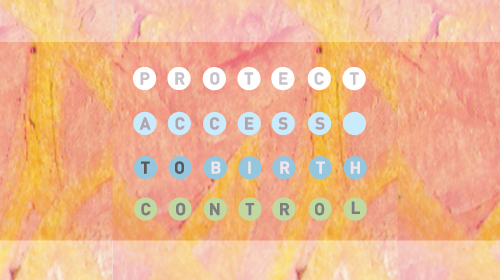
One thing is clear as the bickering on contraception continues — the Obama administration is standing up for women's rights in a big way. Unfortunately, that story has been overshadowed by an attempt to redefine the meaning of religious liberty in our country.
This great contraception debate has kept me up at night contemplating my own rights. Did I trade in my ability to make decisions about my own life when I enrolled at a Catholic law school? That was certainly not my intent. I took no oath, made no promises, and signed no document that said my attendance comes with a commitment to the tenets of Catholicism.
The arguments swirled in my head: the church itself, which sets religious doctrine, spreads the faith, and serves and employs the faithful, has the right to exercise its religious belief (and churches rightly have an exemption from the birth control rule). But does a religiously affiliated university? And what about my rights? The debate is further complicated, by polls showing that many Catholics support the idea of providing access to birth control.
My school champions diversity and celebrates a student body from all religious, racial and ethnic backgrounds. I was attracted to the law school's commitment to the individual and the community, which are explained as based on Catholic traditions, but I did not think that my decision to enroll was an endorsement or acceptance of all Catholic teachings. I enrolled and paid tuition to attain a J.D., not to be a part of the religion.
Despite my own beliefs about what I had agreed or not agreed to, during my first year of law school I was denied coverage for birth control when I presented my health care card at the pharmacy. I walked out bewildered because as long as I've had health benefits, I had never had any problems getting care. I knew that this had to be a mistake. But after several exchanges with the insurance representatives and several more exchanges with school officials asking them to explain the denial, I was only told that contraception is not included in the coverage. That year I was forced to pay for yet another health insurance plan that would cover all of my health care needs. This cost was on top of the costs of the initial, inadequate health coverage, which I would not have signed up for if I had known that it did not include the most basic components of women's healthcare needs. I was upset, confused and felt completely duped.
Some argue that those who go to these institutions know what they are getting into, but I did not. And I am sure that a countless number of workers and students at various hospitals and universities throughout the country do not know either.
In my Constitutional Law class, we learned about the Bob Jones University case. Bob Jones is a religiously affiliated college in South Carolina that practiced racial discrimination based on its interpretation of the Bible. The Supreme Court said that the school could not retain its tax exemption while engaging in practices that are contrary to the nation's public policy goals of equality and eradicating racial discrimination. This case is applicable in the current debate. When religiously affiliated hospitals and universities limit access to contraception, doing so discriminates against women, takes individual rights away and unfairly places burdens on students and workers. This is not religious liberty. Religion should not be used as a tool to discriminate. My law school should not interfere with my rights, or stand between me and my healthcare needs.
I thank President Obama for protecting our right to make our own health care decisions.
Learn more about contraception: Sign up for breaking news alerts, follow us on Twitter, and like us on Facebook.




